

Pricing Carbon: A Carbon Tax or Cap-And-Trade? Back in June, Henry Paulson, the former U.S.
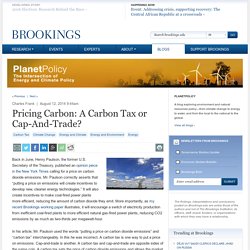
Secretary of the Treasury, published an opinion piece in the New York Times calling for a price on carbon dioxide emissions. Mr. Paulson correctly asserts that “putting a price on emissions will create incentives to develop new, cleaner energy technologies.” It will also create incentives to make coal-fired power plants more efficient, reducing the amount of carbon dioxide they emit. More importantly, as my recent Brookings working paper illustrates, it will encourage a switch of electricity production from inefficient coal-fired plants to more efficient natural gas-fired power plants, reducing CO2 emissions by as much as two-thirds per megawatt-hour. In his article, Mr. Carbon tax or cap-and-trade? What is a carbon tax or carbon fee?
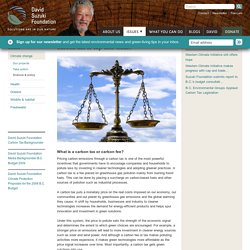
Pricing carbon emissions through a carbon tax is one of the most powerful incentives that governments have to encourage companies and households to pollute less by investing in cleaner technologies and adopting greener practices. A carbon tax is a fee placed on greenhouse gas pollution mainly from burning fossil fuels. This can be done by placing a surcharge on carbon-based fuels and other sources of pollution such as industrial processes. A carbon tax puts a monetary price on the real costs imposed on our economy, our communities and our planet by greenhouse gas emissions and the global warming they cause. A shift by households, businesses and industry to cleaner technologies increases the demand for energy-efficient products and helps spur innovation and investment in green solutions.
Carbon Tax vs Cap & Trade. Cap and Trade vs. Taxes. Climate Policy Memo #1: Cap and Trade vs.
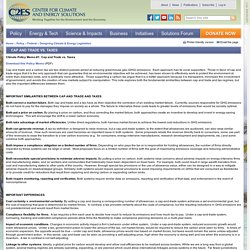
Taxes Download this Policy Memo (PDF) Cap and trade and a carbon tax are two distinct policies aimed at reducing greenhouse gas (GHG) emissions.
British Columbia. California. Washington. Lessons for Climate Change in the 2008 Recession. Photo THERE is a time for weighing evidence and a time for acting.
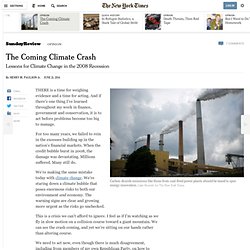
And if there’s one thing I’ve learned throughout my work in finance, government and conservation, it is to act before problems become too big to manage. For too many years, we failed to rein in the excesses building up in the nation’s financial markets. When the credit bubble burst in 2008, the damage was devastating. Millions suffered. We’re making the same mistake today with . This is a crisis we can’t afford to ignore. We need to act now, even though there is much disagreement, including from members of my own Republican Party, on how to address this issue while remaining economically competitive. The solution can be a fundamentally conservative one that will empower the marketplace to find the most efficient response. It’s true that the United States can’t solve this problem alone.
We are building up excesses (debt in 2008, greenhouse gas emissions that are trapping heat now). Emissions cap-and-trade program is working well in California. The climate change debate may seem mostly to be about science, but it's really driven by dollars and cents — what will it take to reduce greenhouse gas emissions, and how much will that cost?
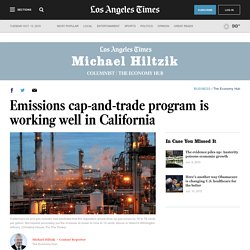
Of all U.S. states, California has taken the most direct approach to settling those questions through a pioneering cap-and-trade program. British Columbia’s carbon tax shift: An environmental and economic success. By Stewart Elgie, Professor of Law & Economics at University of Ottawa and Chair of Sustainable Prosperity; Ross Beaty, Chairman of Pan American Silver Corp. and Alterra Power; and Richard Lipsey, Professor Emeritus of Economics at Simon Fraser University.
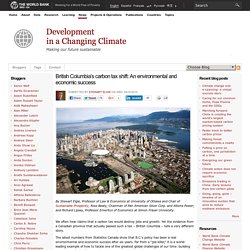
We often hear claims that a carbon tax would destroy jobs and growth. Yet the evidence from a Canadian province that actually passed such a tax – British Columbia – tells a very different story. The latest numbers from Statistics Canada show that B.C.’s policy has been a real environmental and economic success after six years. Inslee directing Ecology to develop regulatory cap on carbon emissions. Gov.
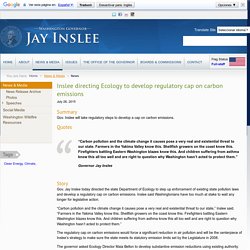
Jay Inslee today directed the state Department of Ecology to step up enforcement of existing state pollution laws and develop a regulatory cap on carbon emissions. Inslee said Washingtonians have too much at stake to wait any longer for legislative action. “Carbon pollution and the climate change it causes pose a very real and existential threat to our state,” Inslee said. “Farmers in the Yakima Valley know this. Shellfish growers on the coast know this.
Will Washington be the first US state to have a carbon tax? Yoram Bauman is the world's only "stand-up economist.
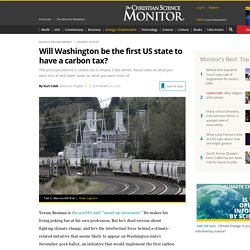
" He makes his living poking fun at his own profession. But he's dead serious about fighting climate change, and he's the intellectual force behind a climate-related initiative that seems likely to appear on Washington state's November 2016 ballot, an initiative that would implement the first carbon tax in the nation. The purpose of the measure, dubbed Initiative 732, would be to motivate households and businesses to cut down on the burning of fossil fuels, the major source of man-made emissions of carbon dioxide, the main greenhouse gas. By raising the price of fossil fuels it would encourage conservation and efficiency and the substitution of low-carbon and carbon-free sources of energy by making these energy sources more cost-competitive. The organization pushing the initiative is Carbon Washington.
In this case, the proposal taxes carbon emissions at a rate of $25 per metric ton. WA Carbon Plan Shows How To Reduce Global Warming. The Political History of Cap and Trade. California’s cap-and-trade program has generated so much money that the state doesn’t know what to do with it. In 2006, California legislators enacted America’s first cap-and-trade program, which forced the state’s biggest polluters to pay into a fund for every ton of CO2 they pump into the atmosphere.
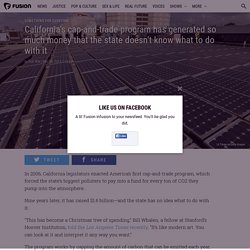
Nine years later, it has raised $1.6 billion—and the state has no idea what to do with it. California's cap-and-trade funds affordable housing. The state's cap-and-trade program this year will provide $122 million in funding for affordable housing, including more than 800 new units in Southern California for lower-income residents.
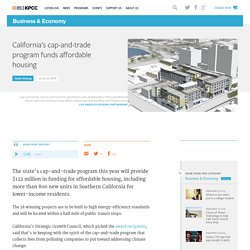
The 28 winning projects are to be built to high energy-efficiency standards and will be located within a half mile of public transit stops. California’s Strategic Growth Council, which picked the award recipients, said that's in keeping with the spirit of the cap-and-trade program that collects fees from polluting companies to put toward addressing climate change. The housing projects will "reduce as much greenhouse gas as taking all the cars in Newport Beach and Citrus Heights up north off the road for a year," said Mike McCoy, the council's executive director. Fortune 500 listed companies pledge to use 100% renewable electricity. Date 23 September 2015 NEW YORK: Goldman Sachs, Johnson & Johnson, NIKE, Inc., Procter & Gamble, Salesforce, Starbucks, Steelcase, Voya Financial, and Walmart have today joined RE100, pledging to source 100% of their electricity from renewable energy to reduce CO2 emissions and seize the business benefits. RE100 is an ambitious global campaign led by The Climate Group in partnership with CDP, to engage, support and showcase influential businesses committed to 100% renewable electricity.
The companies have chosen this year’s Climate Week NYC to unveil their leadership move before senior figures from global business and governments. With December’s COP21 UN climate talks fast approaching, this key milestone event sends a timely reminder to negotiators that leading businesses want strong climate action from governments, while increasing demand for renewables themselves. China climate announcements turn tables on U.S. Congress foes. Pope Francis to the UN: environmental degradation threatens ‘the very existence of the human species’ Pope Francis poses with United Nations Secretary General Ban Ki-moon at the United Nations in New York, Sept. 25, 2015. (Tony Gentile/Reuters) NEW YORK — Before Congress Thursday, Pope Francis’s words on the environment were relatively conciliatory.
He sought “dialogue” – a word the pontiff used 12 times. He did not even explicitly mention the word “climate change,” though he did call on Congress to help “avert the most serious effects of the environmental deterioration caused by human activity.” But speaking to the United Nations General Assembly Friday, Francis transformed into an international policy, law, and development wonk – and above all, the spirited author of “Laudato Si” (“Praised Be”), his stirring encyclical on the environment. “The ecological crisis, and the large-scale destruction of biodiversity, can threaten the very existence of the human species,” Francis said. He also deliberately spoke in the U.N.’s language of rights, but pushed to broaden the very concept. Many Conservative Republicans Believe Climate Change Is a Real Threat. Photo.
Cover Photo Credit.